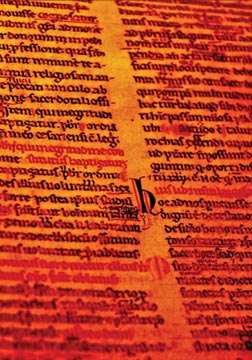Monday, October 8, 2012
5:00 p.m.
Room 107 O’Shaughnessy Hall
SPEAKERS:
Katie Bugyis
(Medieval Institute, University of Notre Dame)
Proclaiming the Gospel at Barking Abbey
Oxford, Bodleian Library, MS Bodley 155
Manuscript witnesses to the liturgical practices of Benedictine women’s monastic communities in medieval England are few in number and often fragmentary. Only one gospelbook survives from these communities: Oxford, Bodleian Library, MS Bodley 155, an early eleventh-century manuscript from Barking Abbey. This paper will examine the corrections, annotations, rubrications, and neumation made to this manuscript in order to argue that it was both produced and used by the women religious at Barking to proclaim the gospel in their liturgies.
Theresa O’Byrne
(Medieval Institute, University of Notre Dame)
Adventures in Paleography
Document Production in Fifteenth-Century Dublin
The field of paleography has changed considerably with the advent of the Digital Age. Paleographers are now asking new questions of manuscript evidence and are consulting non-literary media, such as legal documents, to make startling new discoveries. Recently, new paleographical approaches were used to investigate the life of fifteenth-century scribe and author James Yonge. Discoveries about Yonge have led to further interesting revelations about the production of literature in late medieval Dublin.
Karrie Fuller
(Department of English, University of Notre Dame)
A Sixteenth-Century Copy of Piers Plowman and Its Scribe-Annotator Dialogues
Oxford, Bodleian Library, MS Digby 145 contains a highly personalized version of Piers Plowman, an A/C-text amalgamation copied by its owner, Adrian Fortescue, in the second quarter of the sixteenth century. Accompanying the text is a full set of annotations provided by the hands of Adrian, the unidentified Hand B, and, occasionally, Adrian’s young wife, Anne Fortescue. Over the course of the poem, these annotations change in quality and character as Hand B begins to contribute more frequently and emphatically, and the combined force of the responses reflects a greater focus on theologically charged and exegetically loaded passages as opposed to Adrian’s recurrent and tamer interests. The two poles of readerly interest represented in the selections of annotations to be discussed in this paper, charity and Antichrist, youth and age, constitute personal responses to the poem by one (Hand B), and possibly two (Adrian), emotionally involved readers, whose theological concerns exhibit a reform-minded emphasis portrayed through Hand B’s outright disgust at the Antichrist and his followers and Adrian’s more neutral highlighting of corruption in the Church as well as their emphasis on the solution for these evils found in acts of love and charity. Furthermore, their sixteenth-century reactions to Piers reflect a continued tradition of audience members making use of Langland’s poem with a fervent attention that echoes both the intensity and gravity of Langland’s earlier respondents.

